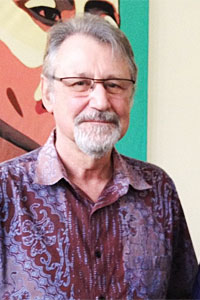
Myanmar's military chief, Snr Gen Min Aung Hlaing, has become the man of the moment in the country's unfolding political crisis. While he and the country's civilian leader, State Counsellor Aung San Suu Kyi, may not trust each other, he has become increasingly her indispensable ally amid the increasing international turmoil surrounding the government's handling of the Rakhine crisis.
As an indicator of their renewed partnership, Ms Suu Kyi extended his term as commander-in-chief for two years, until election year 2020, according to government insiders. This has also raised expectations that he maybe planning to enter politics after his army career ends.

Larry Jagan is a Myanmar specialist and former BBC World Service news editor for the region.
The growing international furore over the government's handling of the violence in its strife-torn western region of Rakhine, the horrific condition of nearly a million Muslim refugees -- who call themselves Rohingya -- who had fled across the border to Bangladesh, and the dilemmas of arranging their safe and voluntary return to Myanmar has left the country almost friendless. International human rights groups and the United Nations have accused the Myanmar military -- or Tatmadaw -- of conducting a campaign of ethnic cleansing in Rakhine, in the aftermath of militant attacks on border police posts in late August last year.
The disaffection of the former US senator Bill Richardson -- asked to be part of the government's carefully selected international advisory board to help with the return of the refugees, their resettlement in Rakhine and assist with the rebuilding and reconciliation process -- has left the Myanmar government shellshocked. His tirade against the State Counsellor in particular was devastating and will have enormous repercussions within the international community. It has thrown the government's planned re-engagement with the international community -- and in particular any attempt to ease tensions with the West -- into reverse gear.
Ms Suu Kyi -- once Myanmar's democracy icon and the darling of the West -- has found herself increasing isolated internationally. She has found herself with fewer and fewer friends, and Western nations -- Japan, the EU and the US -- appear to have turned their backs on her. Within Myanmar there is increasing disillusionment with the State Counsellor's perceived lack of a vision and strategy. While she retains the loyalty of most Myanmar citizens, she has largely lost the support of the country's ethnic groups, civil society and other activists. Her moral leadership, both inside the country and abroad, is being seriously challenged.
Snr Gen Min Aung Hlaing has emerged as a rival leader, whose political aspirations are increasingly evident. "Min Aung Hlaing is now the man," according to diplomats in Yangon. They also believe he is hoping to capitalise on this in future. His popularity among the country's population is rising, his stock within the army has increased and in the wake of Mr Richardson's condemnation, Ms Suu Kyi has little option but to turn to Snr Gen Min Aung Hlaing for support.
The divide between the two remains wide, but the two leaders are beginning to cooperate on a number of crucial issues. On the peace process the two are working closely together, with Beijing being the necessary bonding agent. Their first meeting in nearly a year, last October, was to discuss the political dialogue where they reportedly agreed on their joint opposition to any move to include a provision for secession. Since then it has been clear they are singing from the same hymn sheet, with Chinese support.
Their second meeting -- after they both came back from separate trips to China late last year -- was to discuss succession planning within the army, according to reliable sources in both the military and the government. The result was Snr Gen Min Aung Hlaing's extension -- something the State Counselor had resisted since she extended his term for two years as part of the transition agreement in March 2016.
Sources close to the Lady said she believed she could control the Tatmadaw and its commander because she was Gen Aung San's daughter -- the founder of the Myanmar army and leader of the country's independence movement. But the reality is increasingly that the military are running the show, and Ms Suu Kyi has little alternative but to accept the army's dominant position.
The undeclared "power struggle" between the two of them has been evident for most of the past year, as they endeavoured to endear themselves to the country's key allies and neighbours and present themselves as the country's leader and international statesman. Snr Gen Min Aung Hlaing's forays abroad in the middle of 2017 irritated Ms Suu Kyi, according to sources close to her.
When he visited India and Japan, and earlier several EU countries, she blamed the host nations for being taken in and boosting his credibility on the international stage: in all these countries he was entertained by the respective heads of state. In India and Japan in particular, the civilian heads of state do not normally meet visiting military commanders -- it runs counter to diplomatic protocol. But both India's prime minister, Narendra Modi and Japan's prime minister, Shinzo Abe met Snr Gen Min Aung Hlaing.
But what was not reported at the time was how Snr Gen Min Aung Hlaing tried to upstage the State Counsellor and to isolate her. In both cases he stressed that the Myanmar military was strictly non-aligned, and did not support Beijing -- exploiting the fact that both Delhi and Tokyo are China's international rivals, especially within the Asia region. He told both leaders this was in stark contrast to the country's civilian leader, who had thrown her lot in with the Chinese, he said.
This irked the Chinese leaders, especially their generals, who regarded the Myanmar military, and their commander Sen Gen Min Aung Hlaing in particular, as steadfast friends. But the upheaval in Rakhine since August last year has totally changed the situation. Before that Snr Gen Min Aung Hlaing and his top brass had believed they could even woo Washington. The Tatmadaw leader believed he was going to be invited to America by the US Secretary of State for Defence. Apparently he entertained the idea that Myanmar would be allowed to buy US-made military transport aircraft, the Lockheed C-130 Hercules, according to sources close to the senior general.
These four-engine turboprop military transport aircraft are almost unique: capable of using unprepared runways for takeoffs and landings, and their various uses include being a gunship for airborne assault, search and rescue, maritime patrols and aerial fighting. "There no way in heaven that Myanmar would have been sold these planes," a senior US military attache told the Bangkok Post at the time. The irony is of course that there is a civilian version of the plane, the L-130 that the US administration could not have prevented being sold, and could easily be made combat ready, said the same source.
Now of course this US rapprochement is a dream of the past. Instead of being welcomed to Washington, selective sanctions are being imposed on certain top Myanmar military commanders who are regarded to have orchestrated the crackdown in Rakhine. According to insider sources, Ms Suu Kyi may have been instrumental in encouraging Washington to take a hard line against the Myanmar military and to label the crackdown as ethnic cleansing.
Now instead of a red carpet Snr Gen Min Aung Hlaing faces the prospect of international criminal charges. While Ms Suu Kyi may have used this as a lever to keep the military in check, it is likely to haunt the State Counsellor instead, as she will have to pull out all stops to prevent it happening. So Mr Richardson's personal tirade against Ms Suu Kyi will not only weaken her standing internationally, but to all intents and purposes it has strengthened Snr Gen Min Aung Hlaing's position at home.
